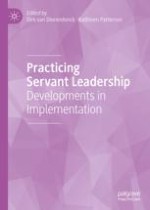2018 | OriginalPaper | Buchkapitel
10. Building a People-Oriented and Servant-Led Organization
verfasst von : Dirk van Dierendonck
Erschienen in: Practicing Servant Leadership
Aktivieren Sie unsere intelligente Suche, um passende Fachinhalte oder Patente zu finden.
Wählen Sie Textabschnitte aus um mit Künstlicher Intelligenz passenden Patente zu finden. powered by
Markieren Sie Textabschnitte, um KI-gestützt weitere passende Inhalte zu finden. powered by
